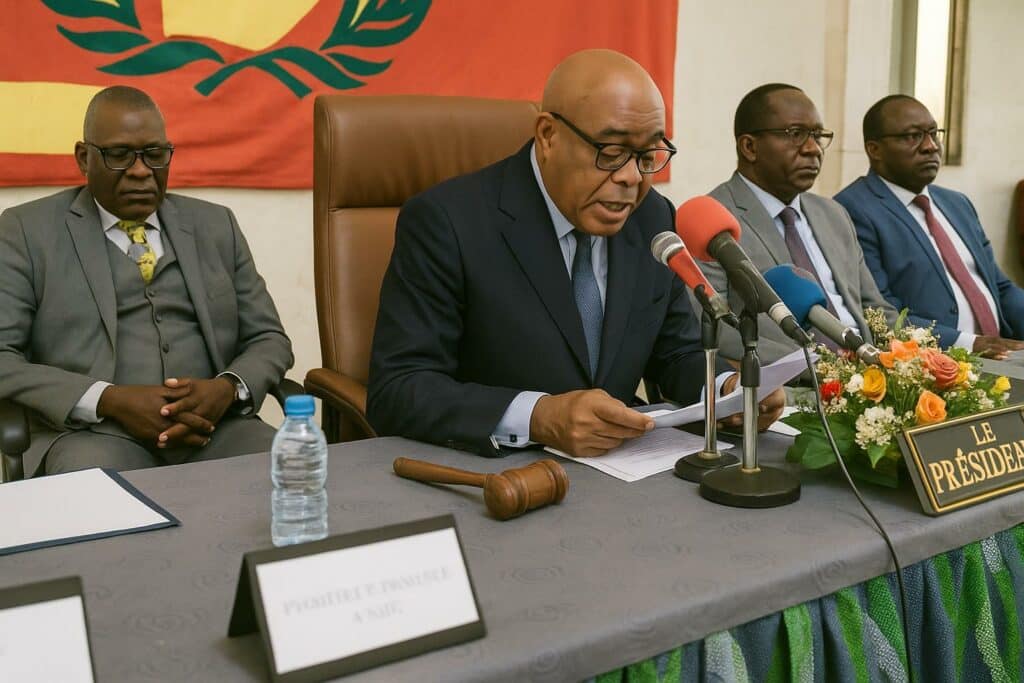Strategic Vision Takes Shape in Brazzaville
An atmosphere of quiet resolve pervaded the headquarters of the Congolese National Human Rights Commission as its eleven commissioners convened from 22 to 25 September 2025. Under the chairmanship of Casimir Ndomba, the ordinary session produced what participants readily described as a turning point: the unanimous adoption of a triennial strategic plan covering the period 2025-2028. The document translates the commissioners’ collective ambition into measurable objectives centred on justice, social cohesion and the protection of individual liberties, key priorities explicitly encouraged by the President of the Republic (final communiqué).
The gathering was the first formal meeting of the body since its election in May, a circumstance that imbued the proceedings with both solemnity and urgency. “These texts will enable us to evolve from noble intentions to operational effectiveness,” Ndomba asserted in his closing remarks, calling the session “a decisive milestone on our path toward institutional excellence.”
Governance Tools Anchored in Transparency
Beyond the strategic plan, commissioners examined and adopted two internal instruments: the Rules of Procedure and the Financial Regulations. Framed as safeguards for accountability, these bylaws delineate decision-making channels, budgetary oversight and reporting obligations. Ndomba extolled the Financial Regulations as “a genuine vehicle of transparency and good governance,” underscoring the Commission’s determination to align with international best practices while preserving its statutory independence.
Five Specialised Sub-Commissions for Field Impact
Operational depth will hinge on the newly-established five sub-commissions that mirror the institution’s substantive mandates, from monitoring detention conditions to promoting civic education. Designed to function as the Commission’s technical backbone, the units are expected to conduct fact-finding missions, draft thematic reports and propose remedial recommendations to the competent authorities. According to the session’s minutes, each sub-commission will enjoy delegated autonomy while remaining collectively accountable to the plenary. Such architecture seeks to accelerate response times and bring the Commission’s actions closer to citizens’ daily realities.
United Nations Backing and Civil Society Interface
Symbolising the international confidence placed in the young institution, Abdourahmane Diallo, Resident Coordinator of the United Nations System in Congo, attended the opening ceremony. In brief remarks he lauded the inclusive approach adopted, affirming that “a credible national mechanism is indispensable for the realisation of the Sustainable Development Goals”. Representatives of long-standing civil-society partners echoed that view, stressing the need for systematic consultation in order to enhance the Commission’s legitimacy. The presence of these stakeholders illustrated a shared conviction: sustainable human-rights progress emerges from a triangle of state institutions, multilateral support and grassroots engagement.
À retenir : Une impulsion présidentielle assumée
While the Commission maintains functional autonomy guaranteed by national legislation, its very creation stems from the executive’s stated will to consolidate the rule of law. Ndomba reminded his peers that “the Head of State’s commitment obliges us to deliver tangible results through rigorous, impartial and responsible work.” His exhortation points to an implicit social contract: institutional independence on the one hand, constructive cooperation with public authorities on the other—a balance frequently recommended by the African Commission on Human and Peoples’ Rights.
Le point juridique : Vers une institution de référence régionale
From a comparative-law perspective, the newly enacted bylaws respond to the Paris Principles that govern national human-rights institutions. Public-law scholars consulted during the session emphasised that the triennial plan offers measurable indicators—periodic reporting, stakeholder audits and budgetary ceilings—that could facilitate eventual accreditation at “A” status within the Global Alliance of National Human Rights Institutions. Such recognition would reinforce Congo-Brazzaville’s voice in continental forums, while also stimulating peer-learning with neighbouring commissions in Central Africa.
Outlook for 2026 and Beyond
Concluding the session, the president expressed the hope that the momentum generated would persist well beyond the inaugural plenary. The next twelve months will test the Commission’s capacity to translate strategy into action: field visits, public hearings and an inaugural annual report are already pencilled in its calendar. In Ndomba’s words, the challenge is clear: “to build a strong, credible commission at the service of human dignity in the Republic of Congo.” If realised, the 2025-2028 roadmap could well position the CNDH as both guardian and catalyst of the country’s enduring quest for justice and social harmony.

